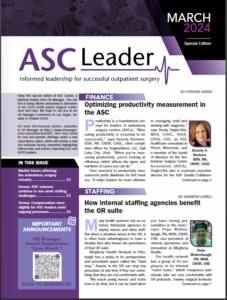
Survey: Satisfaction up, compensation stable for ASC leaders

ASC leaders’ satisfaction has increased significantly compared to a year ago, according to the 2024 OR Manager Salary/Career Survey. In all, 81% of respondents were satisfied with their current job/position, up from 70% in 2023, and 27% reported being “completely satisfied,” compared to 17% last year. In fact, the favorable…
How perioperative staff can combat human trafficking—Part 2

Human trafficking (HT) is a hidden-in-plain-sight crime—victims walk among the public at large, yet they remain essentially invisible. Lack of education and knowledge on HT and anti-trafficking measures is particularly egregious in healthcare. In fact, the literature shows the majority of people being trafficked access the system without being identified…
Offsite sterilization fuels onsite efficiency for lean ASCs

For many in the healthcare industry, imagining surgery without onsite sterile processing seems unthinkable. Then again, performing total joints in an ambulatory surgery center (ASC) was unthinkable 10 years ago. ASC sterile processing departments (SPDs) are generally not designed to handle the high volumes of instrument trays, vendor trays, and…
How perioperative staff can combat human trafficking—Part 1

Human trafficking (HT) is a global public health crisis and one of the fastest growing criminal enterprises that grosses hundreds of billions of dollars annually, all of which are tax-free profits made off the sale of human cargo. And yet, research shows the problem is poorly understood or recognized among…
Survey: ASC volume rising amid limited staffing improvement

Takeaways • Compared to 2023, the percentage of respondents reporting an increase in open positions for RNs and STs, as well as increased turnover for RNs, remained stable, but fewer reported a drop in ST turnover. • The percentage of respondents reporting hiring more managers set a 9-year record. •…
Surgical ethics: Does money speak louder?

Although I am not a healthcare professional, working for OR Manager offers a peek behind the curtain. What I have learned so far has left me feeling a bit conflicted. When I took this job back in December, I assumed the hospital ecosystem was driven entirely by the Hippocratic Oath.…
Unpacking the impact of private investment on innovation, ASCs

One privilege of living at this time in history is the availability of choice, especially for health and surgical needs. Those who make healthcare their business understand this as well. According to Tanna et al, ambulatory surgery centers (ASCs) are spreading to rural areas, hospitals are creating hybrid outpatient surgery…
ASC management is a skill: A day in the administrator role

The administrator of an ambulatory surgery center (ASC) wears many hats, doing every odd job in the book to keep their free-standing center safe, compliant, and operational. But what does “wearing many hats” mean exactly? OR Manager spoke with Nyleen Flores, CPMSM, CPCS, CPCO, CASC, chief administrative officer at Lake…
The US News journey to introduce a new ‘best’ ASCs ranking

Some 800,000 knee replacements and 550,000 hip replacements are performed in the US each year. Factoring in the ever-expanding aging population, projections show the figure for knee replacements alone will explode to 3.5 million procedures being done annually by 2030—and that is just one type of procedure within a single…
Scaling standards from sterile processing department to clinic

Reforming instrument reprocessing practices does not always end with the main sterile processing department (SPD). Holding clinics to the same standard adds to the challenge, whether they are associated with hospitals or operate independently. Nonetheless, standardization is just as essential to maintaining efficiency and quality standards. Whether a clinic is…


